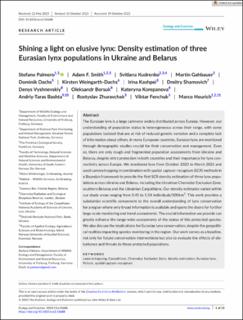Shining a light on elusive lynx: Density estimation of three Eurasian lynx populations in Ukraine and Belarus
Palmero, Stefano; Smith, Adam F.; Kudrenko, Svitlana; Gahbauer, Martin; Dachs, Dominik; Weingarth-Dachs, Kirsten; Kashpei, Irina; Shamovich, Dmitry; Vyshnevskiy, Denys; Borsuk, Oleksandr; Korepanova, Kateryna; Bashta, Andriy-Taras; Zhuravchak, Rostyslav; Fenchuk, Viktar; Heurich, Marco Dietmar
Peer reviewed, Journal article
Published version
Permanent lenke
https://hdl.handle.net/11250/3122064Utgivelsesdato
2023Metadata
Vis full innførselSamlinger
Sammendrag
The Eurasian lynx is a large carnivore widely distributed across Eurasia. However, our understanding of population status is heterogeneous across their range, with some populations isolated that are at risk of reduced genetic variation and a complete lack of information about others. In many European countries, Eurasian lynx are monitored through demographic studies crucial for their conservation and management. Even so, there are only rough and fragmented population assessments from Ukraine and Belarus, despite strict protection in both countries and their importance for lynx connectivity across Europe. We monitored lynx from October 2020 to March 2021 and used camera trapping in combination with spatial capture–recapture (SCR) methods in a Bayesian framework to provide the first SCR density estimation of three lynx populations across Ukraine and Belarus, including the Ukrainian Chornobyl Exclusion Zone, southern Belarus and the Ukrainian Carpathians. Our density estimates varied within our study areas ranging from 0.45 to 1.54 individuals/100 km2. This work provides a substantial scientific component to the overall understanding of lynx conservation for a region where only broad information is available and opens the doors for further large-scale monitoring and trend assessments. The crucial information we provide can greatly enhance the range-wide assessments of the status of this protected species. We also discuss the implications for Eurasian lynx conservation, despite the geopolitical realities impacting species monitoring in the region. Our work serves as a baseline, not only for future conservation interventions but also to evaluate the effects of disturbance and threats to these protected populations.

